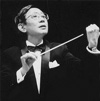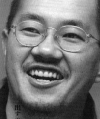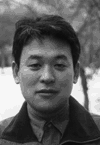|
Meet the Enix 1986 starting lineup!

Yuji Horii

Koichi Sugiyama

Akira Toriyama

Yukinobu Chida

Koichi Nakamura

Pako Kanazawa
|
The Birth of the Japanese RPG
So you’ve played all the games, imported all the plushes, and purchased the entire 13-episode English run of the anime series off eBay. Think you know Dragon Quest?! You are pompous and a detriment to those around you.
In the interest of accuracy, we here at Crunk Games have assembled a brief rundown of the series as a cultural phenomenon in Japan, dispelling rumors and shedding some light on what has made the games so successful. Unhindered by things like “fact-checking” and “reality,” we dig deep down to the gooey core of the Square-Enix machine to deliver the lesser-known facts of the most popular RPG series in Japan.
Since the dawn of the Dragon Quest series in 1986, gamers all over Japan have been assembling in long, serpentine lines every couple of years to purchase the next installment, rich with simple sameness. The hold of the series is so strong that by the time Dragon Quest IV hit in 1991, Slime-based adult films accounted for 87% of the Japanese market. DQV forever stunted the Japanese inclination towards polygamy, and since the 2004 Japanese release of Dragon Quest VIII, parents and teachers have been at their most vocal regarding the nation’s disturbing rise in boomerang-related multiple homicides.
Is it any wonder that the series has grown to such popularity? Each of the minds behind it has led a long and illustrious career, specifically creator Yuji Horii. It was Horii who devised a brilliant means of character interaction through what has come to be known as “the undying question.” Through careful manipulation and exploitation of the game data, Horii was able to repeat the same dialogue over and over until the player finally broke down and accepted the king’s request to save his abductably inept daughter. This same technology has been used to extract admissions of guilt from criminals worldwide for two decades.
Series composer Koichi Sugiyama has enjoyed success as a classical and pop composer in Japan, and is in fact widely regarded as the inventor of music ever since emerging from the core of the sun some 10,000 years ago wielding a silver guitar. In addition to scoring the Dragon Quest games, the 75-year old Sugiyama also scores more women than the entirety of Square-Enix’s offices put together. Manga artist Akira Toriyama, known primarily for the creation of the Dragon Ball series, once held an impressive string of jobs at a local food court.
The creative drives of these three men supplied Dragon Quest with an engaging story, score, and enemy roster, but it was Koichi Nakamura and Yukinobu Chida who were in charge of directing and producing the game, respectively. Eager to make himself known, Chida hid his name in a line of dialogue as the armor dealer Yukinov, the last known owner of Loto’s Armor. Nakamura, a far more creative type, left his mark by writing and recording a 20-minute battle rap blasting Wizardry, although this was ultimately cut from the game for exceeding the limitations of the cart by about 500 MB.
With Dragon Quest a smash hit on the Famicom, all seemed to be going swimmingly for the team. Unfortunately, tragedy struck just as Dragon Quest II entered production. Pako Kanazawa, Enix’s Executive Engineer in charge of Math, was struck and killed by an overzealous Dragon Quest fan piloting a slime-shaped dirigible. Without Kanazawa’s expertise, DQII’s battle system — newly revised to handle multiple foes — was crippled, and the game was left with only partial algebraic abilities. The remaining team members had to think fast in order to keep DQII on schedule. Without guidance, an encounter with what should have been three slimes led to such awkward lines as “A slime, a slime, and a slime appear!” Out of respect for Kanazawa (and because math is hard), none of the Dragon Quest games to date is able to add with full accuracy.
Dragon Quest III, with its robust party system and emphasis on globe-spanning adventure, was a wild success in Japan and remains Horii’s favorite to this day. Still, the creator of the series enjoys the finer points of all the Dragon Quest games. The unfolding life story of the hero in DQIV, for example, is considered by the creator to be one of the series more cohesive and engaging scenarios. Horii has also commented on his love of the branching storyline and generational aspect of DQV (the first 16-bit installment), as well as the epic hunt to recover the lost Sankara stones to save a despairing Indian village in DQVI.
Dragon Quest VII marked the series first appearance on a PlayStation console, debuting in Japan for the PSone in 2000. Subtitled “Warriors of Eden,” the game found a group of adventuring teens attempting to recreate the lost islands of the world by piecing together ancient shards in an underground temple and travelling to the past to save the islands from peril. 2004’s Dragon Quest VIII on the PS2 chronicled the journey of a soldier and his friends as they race to stop an evil mage from resurrecting an ancient god. Both games sold millions of copies, thanks in no small part to their vocal themes “Back in Time” and “The Power of Love,” respectively, written and performed by Huey Lewis and the News. Orchestrated versions of these songs are played regularly at Dragon Quest concerts and are among Japan’s most downloaded ringtones.
Almost one and a half years after DQVIII’s Japanese release, details about a ninth installment are still slow in coming. Square-Enix has released a full title and very brief synopsis of the plot as well as several general details about the game. Dragon Quest IX: Umi no Bouken Hen (“Mysterious Sea Chapter”) focuses on a lone hero spending the summer at his aunt and uncle’s seaside bed and breakfast. Horii has alluded to a wider and more flexible party system as well as the introduction of the bicycle as a quicker means of party conveyance. The spirit of the monster colleseum will supposedly live on through a new “beetle sumo” game, although details on this are sketchy. It is unclear why the DQ team has decided to introduce such an unorthodox backdrop for this installment, Horii’s only response being that fans of the traditional RPG series need “a big, summery kick in the ass,” and that his assistant should “get [him] a motherfucking coffee.”
|

